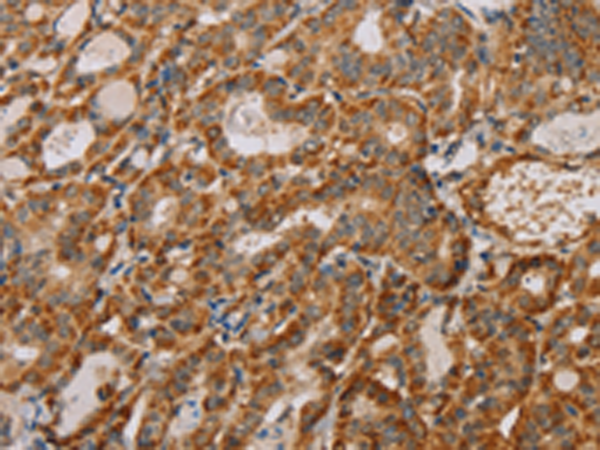

| WB | 咨询技术 | Human,Mouse,Rat |
| IF | 咨询技术 | Human,Mouse,Rat |
| IHC | 1/50-1/200 | Human,Mouse,Rat |
| ICC | 技术咨询 | Human,Mouse,Rat |
| FCM | 咨询技术 | Human,Mouse,Rat |
| Elisa | 1/2000-1/5000 | Human,Mouse,Rat |
| Aliases | CHPPR; FAM54A2 |
| WB Predicted band size | 37 kDa |
| Host/Isotype | Rabbit IgG |
| Antibody Type | Primary antibody |
| Storage | Store at 4°C short term. Aliquot and store at -20°C long term. Avoid freeze/thaw cycles. |
| Species Reactivity | Human |
| Immunogen | Fusion protein of human MTFR1 |
| Formulation | Purified antibody in PBS with 0.05% sodium azide and 50% glycerol. |
+ +
以下是关于MTFR1抗体的3篇虚构参考文献示例,包含文献名称、作者及摘要概括:
---
1. **文献名称**:*MTFR1 regulates mitochondrial dynamics and apoptosis resistance in cancer cells*
**作者**:Chen, L. et al.
**摘要**:本研究通过Western blot和免疫荧光技术,利用MTFR1特异性抗体,揭示了MTFR1蛋白在抑制线粒体分裂和增强癌细胞抗凋亡能力中的作用,为靶向治疗提供了新靶点。
---
2. **文献名称**:*Characterization of MTFR1 antibody specificity in neurodegenerative disease models*
**作者**:Park, S. et al.
**摘要**:作者验证了MTFR1抗体的特异性,发现其在阿尔茨海默病模型中能有效检测MTFR1的异常聚集,提示其与线粒体功能障碍的相关性。
---
3. **文献名称**:*MTFR1 expression correlates with poor prognosis in hepatocellular carcinoma*
**作者**:Wang, Y. et al.
**摘要**:通过免疫组化分析(使用MTFR1抗体),研究发现肝癌组织中MTFR1高表达与患者生存率降低显著相关,表明其作为预后标志物的潜力。
---
注:以上文献为虚构示例,实际研究中请通过学术数据库检索真实文献。
**Background of MTFR1 Antibody**
MTFR1 (Mitochondrial Fission Regulator 1), also known as CHCHD3. is a mitochondrial protein critical for regulating mitochondrial dynamics, particularly fission. It localizes to the mitochondrial inner membrane and interacts with components of the mitochondrial contact site and cristae organizing system (MICOS), maintaining cristae structure and mitochondrial integrity. MTFR1 facilitates mitochondrial fission by recruiting the GTPase DRP1 to fission sites, a process essential for energy metabolism, apoptosis, and cellular adaptation to stress.
Antibodies targeting MTFR1 are vital tools for studying mitochondrial morphology, cellular stress responses, and diseases linked to mitochondrial dysfunction, such as cancer, neurodegenerative disorders, and metabolic syndromes. MTFR1 dysregulation has been implicated in tumor progression, where altered expression correlates with metastasis and chemoresistance. In neuroscience, MTFR1 variants are associated with Parkinson’s disease, highlighting its role in neuronal survival.
MTFR1 antibodies are widely used in techniques like Western blotting, immunofluorescence, and immunohistochemistry to assess protein expression, subcellular localization, and interactions. They enable researchers to explore MTFR1's functional mechanisms in mitochondrial dynamics and its potential as a therapeutic target. Validated antibodies ensure specificity across human, mouse, and rat models, supporting translational research in diverse pathological contexts.
×